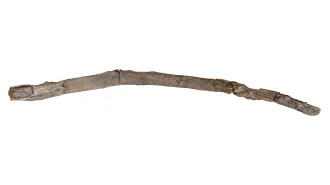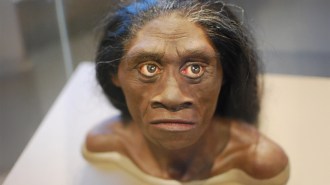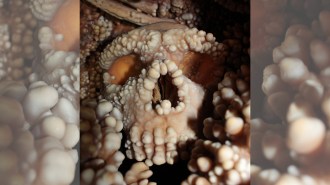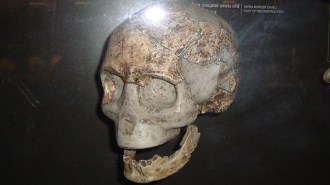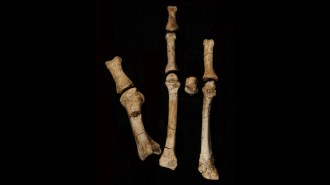Petite primate fossil could upend ideas about ape evolution
11.6-million-year-old fossil suggests a gibbonlike creature was modern apes’ common ancestor
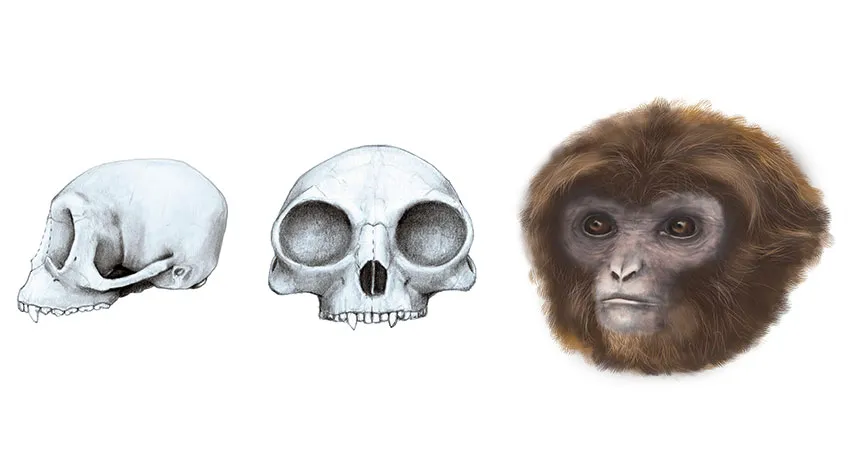
LITTLE BIG APE A reconstruction of a fossil primate’s 11.6-million-year-old skull, shown from the side and the front, reveals a mix of apelike and monkeylike features. This creature, depicted at right, may have been a surprisingly small ancestor of all modern apes.
Marta Palmero/Institut Catala de Paleontologia Miquel Crusafont (ICP)
An ancient primate’s partial skeleton, discovered in northeastern Spain, is poised to downsize ape evolution in a big way.
This 11.6-million-year-old fossil find, nicknamed Laia by its discoverers, represents the first evidence that present-day African apes descended from a relatively small, somewhat gibbonlike common ancestor — not large-bodied African primates as previously thought, scientists report in the Oct. 30 Science. If that scenario holds up, Laia’s discovery also shows for the first time that ancient, small-bodied apes moved from Africa to Europe, says a team led by paleontologist David Alba of Catalan Institute of Paleontology in Barcelona.
Based on analysis of more than 300 teeth, skull and lower-body measurements, Alba and colleagues assign the partial skeleton to a new genus and species of ancient ape, Pliobates cataloniae.
Some scientists caution that there are other possible evolutionary identities for the extinct Spanish creature. It may not be an ancestor of all living apes — a group split into small-bodied apes (gibbons and siamangs) and large-bodied apes (chimps, gorillas and orangutans). Critics say that Laia might be an ancestor just of gibbons, an evolutionary group that split off from greater apes roughly 14 million years ago but whose origins are murky. Or, Pliobates could belong to a line of now extinct monkeylike animals.
Those possibilities reflect the unusual mix of features from apes and monkeys on Laia’s partial skeleton. But among other ancient apes known to have lived between 25 million and 5 million years ago, Pliobates displays the most skeletal similarities to all modern apes, Alba’s team finds. Those shared features were presumably inherited from a common African ancestor of Pliobates and living apes. Previous DNA studies suggest that a common ancestor of present-day apes lived around 20 million to 15 million years ago.
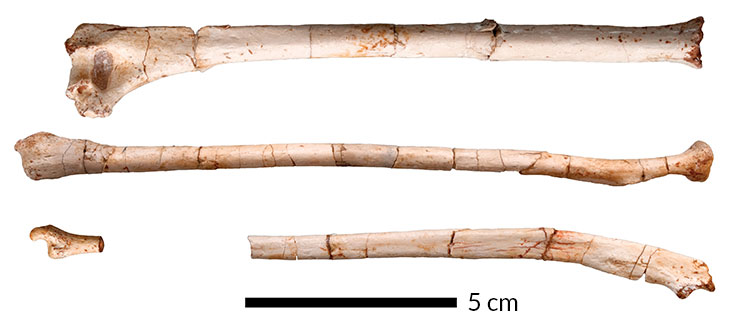
The researchers estimate that Pliobates weighed 4 to 5 kilograms, about as much as the smallest present-day gibbons. Laia’s relatively small braincase falls within the range of modern African monkeys, gibbons and siamangs. Several of the ancient ape’s facial characteristics, including gogglelike rims around the eye sockets, also resemble those of gibbons.
Like ancient African apes, Pliobates was a tree dweller, Alba says. Arm fossils indicate that Laia moved across branches on all fours with her palms down. Like modern apes, Laia had wrists capable of rotating while she climbed. Her elbow, though, was not built like those of living apes to enable hanging from tree branches.
In stark contrast to her apelike features, Laia had wide ear openings similar to those of monkeylike primates, known as pliopithecids, that lived in Europe and Asia from 17 million to 10 million years ago.
Due to this mishmash of features, many questions remain about Pliobates’ evolutionary status.
Laia may have been a monkeylike pliopithecid that happened to evolve partly apelike arms, say paleoanthropologists Brenda Benefit and Monte McCrossin, both of New Mexico State University in Las Cruces, in the same issue of Science.
Paleoanthropologist David Begun of the University of Toronto agrees. Skull and tooth features unlike those of apes suggest that the new fossils represent a pliopithecid with some unusual add-ons, such as apelike wrists, he holds.
Fossil discoveries increasingly indicate that different species independently evolved similar skeletal features during ape evolution, says paleoanthropologist John Fleagle of Stony Brook University in New York. So he says it’s hard to know if Pliobates was an ape or a pliopithecid, or an ancestor only of gibbons or of all modern apes.
“This specimen is extremely interesting and enigmatic,” Begun says.


